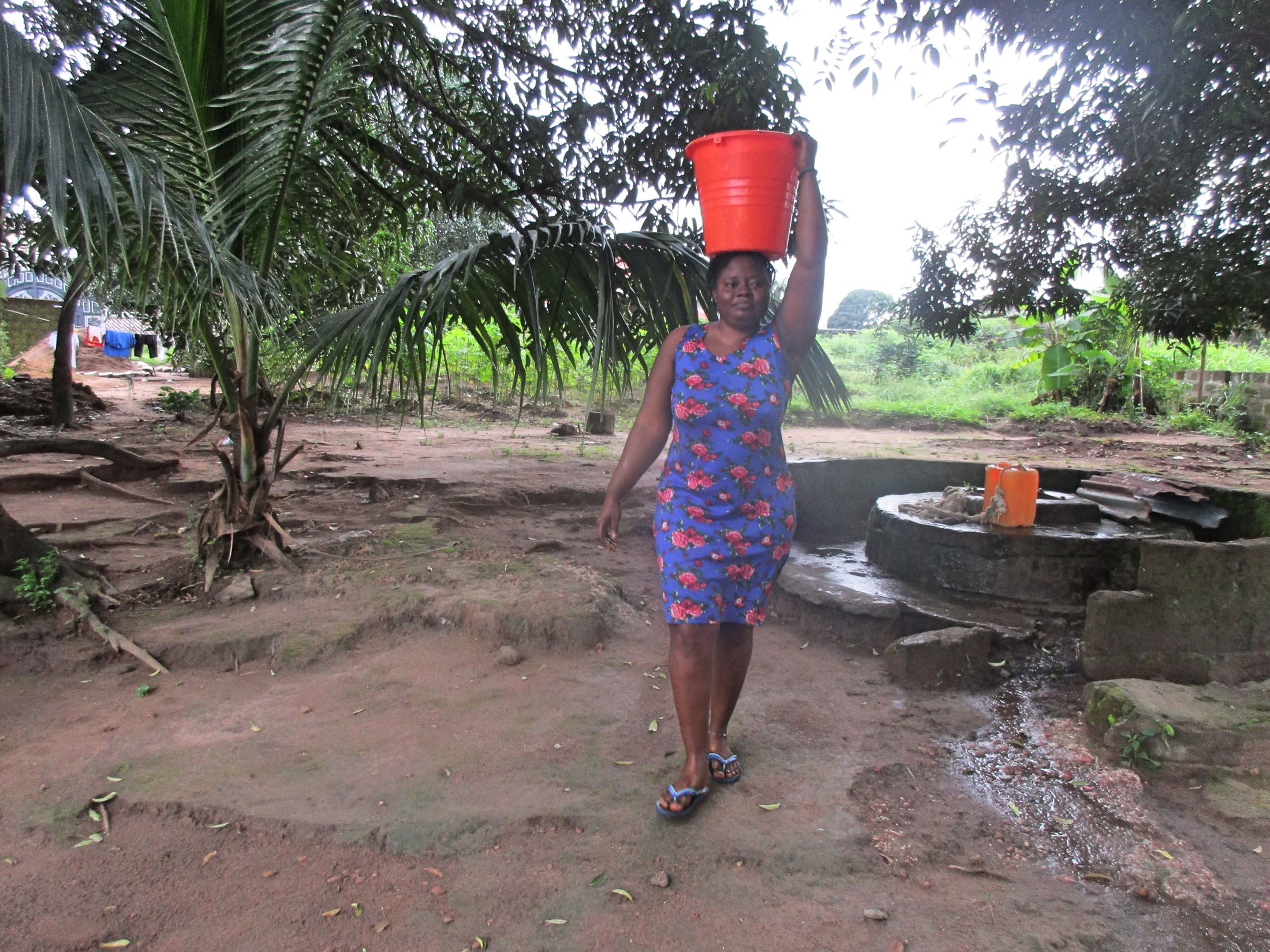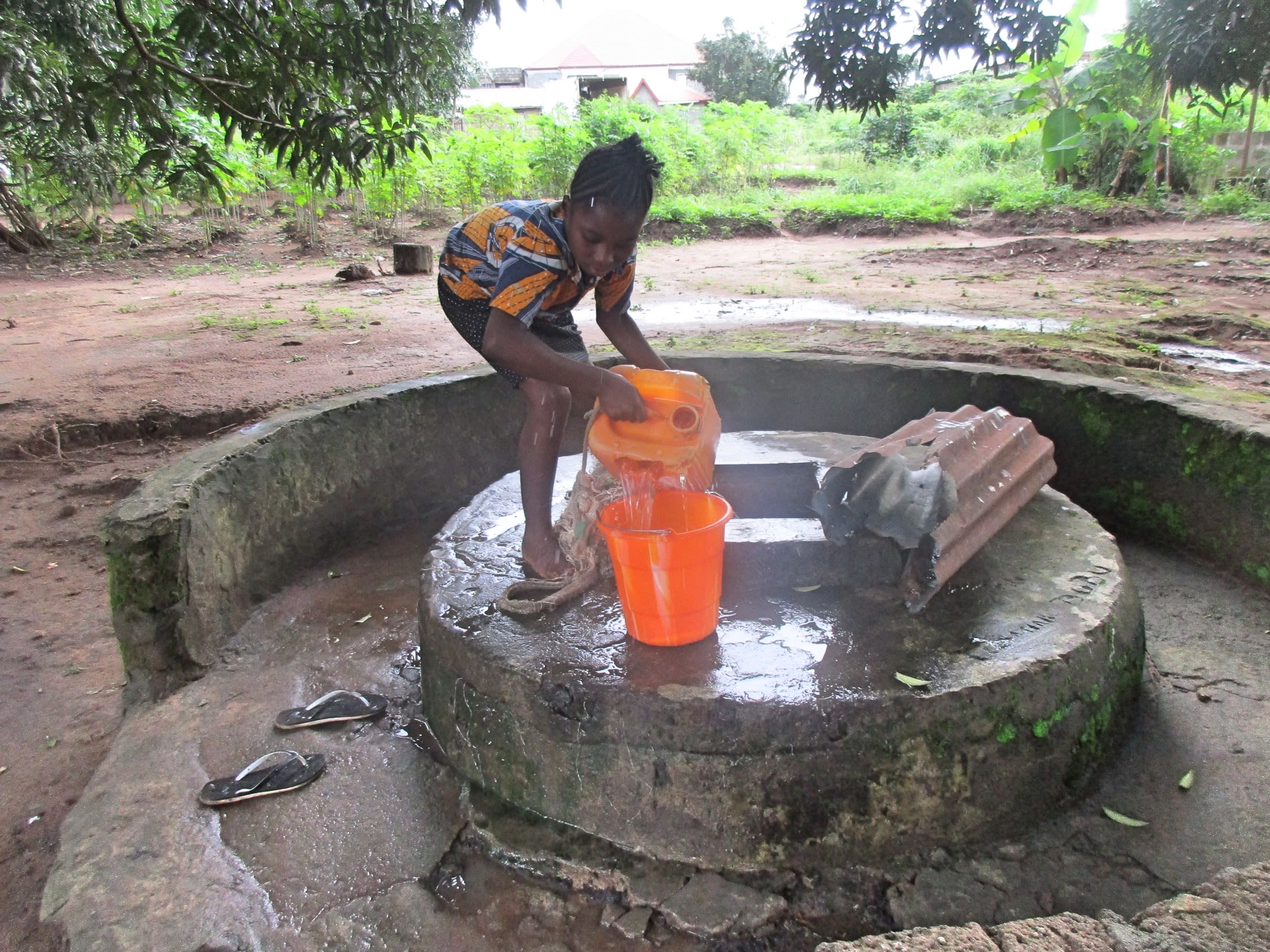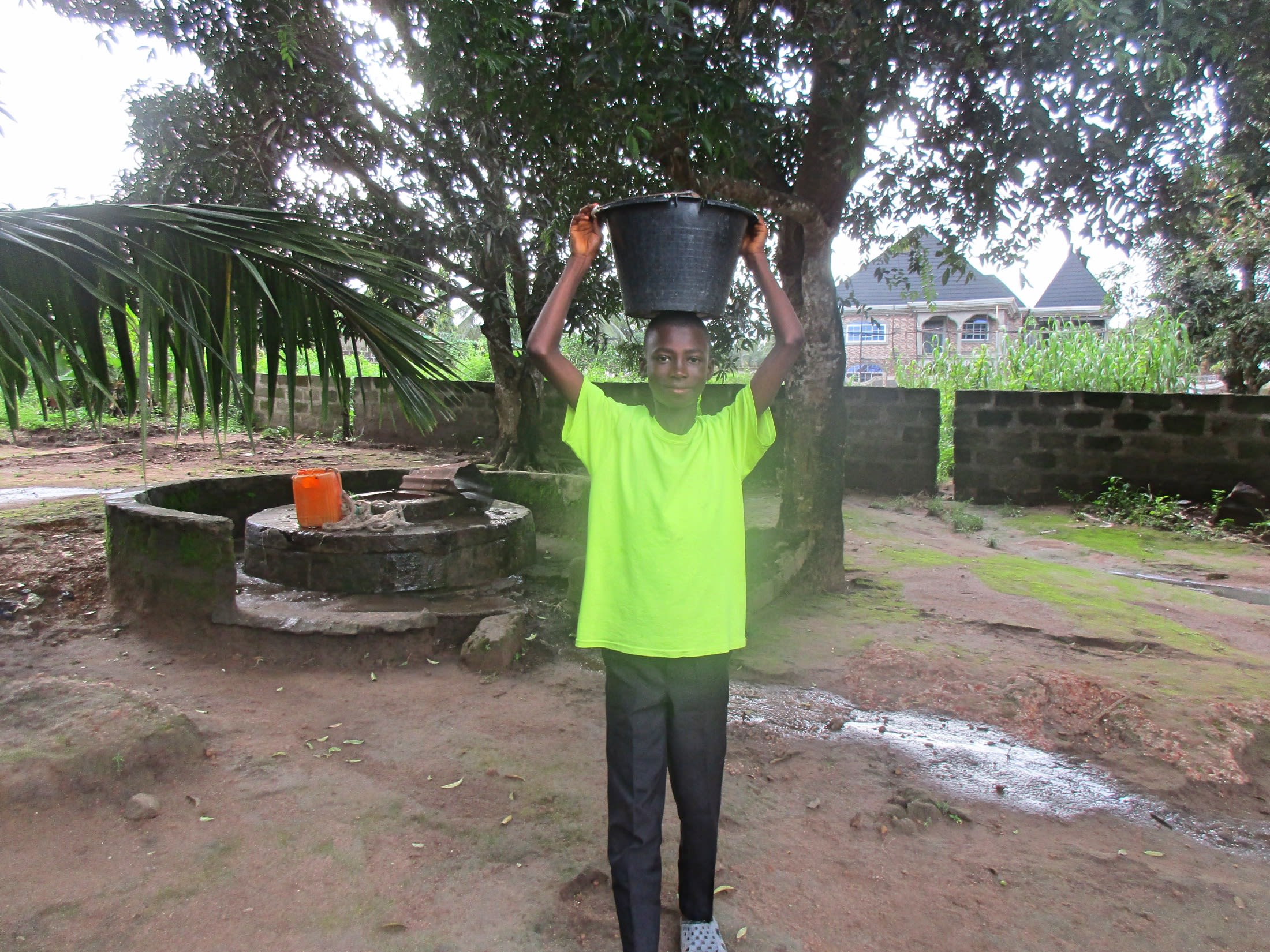Water in this section of Masoila is both contaminated and difficult to obtain, which makes life hard for the 182 people who live here.
"The water situation in my community is really affecting me," said 30-year-old trader Aminata Kamara (pictured below leaving the well).

"I find it hard to fetch water from the open well because a lot of energy is required," she continued. "I must bend down and dip the gallon [jug] into the well. To pull the [jug] from the well using the rope becomes difficult for me. Most times, I would not be able to do many trips. I experience back pain and joint pain because of this reason."

But the well in Masoila is also overcrowded, with people from several different communities all coming to fetch water here. Because of this, getting water, especially during busy times like early morning and evening, eats up a lot of time and energy.
"Another challenge I face when fetching water at this source is the high number of water users that normally visit the water point," Fatmata explained.
"Fetching water from this source becomes difficult since I spend a lot of time waiting for my turn to fetch water," Fatmata continued. "The thing that pains me more is when the people that I normally meet at the water point delay me from fetching water. They would not allow me to fetch water until they are through. Even if I plead with them, they still would not allow me [to fetch water]. This prolongs the waiting time at the water point. As a result, I would end up returning home with empty containers."
Unfortunately, this series of problems isn't unique to Fatmata. Everyone in Masoila is struggling to get enough water, as 15-year-old Abu (pictured below) explained.

"I find it very hard to fetch water for my parents, especially in the morning hours," Abu said. For me to fetch water, I must walk a far distance to the water source. I must wake up early in the morning to access the water point. Fetching water from this source is hard because the water point gets overcrowded. I usually [take a lot of time] at the water well because of the method of fetching water from the well, and it is time-consuming. It would be very hard for me to make many trips because I would be very exhausted. Therefore, I only do [a] few trips."
There are a few factors worsening the situation beyond the long wait time and the labor-intensive fetching process. The well in Masoila is hand-dug and unprotected, so it's not very deep. Not only does the well dry up during seasons when there isn't much rain, but the water is open to surface runoff, which contaminates the water with pollutants from households, farms, and latrines. Our field officer also observed trash and leaves in the water, which is hardly ideal for drinking.
"It is really frustrating for this community to drink such water," said our field officer, Alie. "The community members use a rope and then tie it to the container. They dip the container into the well to pull [out] some water. The rope they use to draw the container from the well is very dirty and it is always on the well. Most of the time, the thread from the rope can be seen inside the water, but people still use this water to drink. Drinking this water will lead to contact with waterborne diseases. I really pity them because using such water to drink or cook is not safe."

But contaminated water is better than no water at all. And when the well dries up, Abu has to beg his neighbors, who have private wells, for water.
"I must go in search of water from other sources, but [they are] private water wells," Abu said. "It is not easy for me, and there are times I would not be fortunate to fetch water from these sources because their water points always get locked."
All this time spent worrying, waiting, and walking for a meager amount of water means that even the most basic household tasks become nearly impossible.
"It would be very difficult for this community to prepare food on time, bathe, launder clothes and get access to clean and safe water to drink," Alie said. "Sometimes, these activities hardly [get completed], which affects them greatly."
"By the time I eventually fetch water, I would get limited time to cook, and it is really affecting me not to get food on time," Fatmata said. "I find it hard to launder my dirty clothes."
"During the weekend I have to launder my clothes as well as [my school] uniform. Since the well is seasonal, fetching water to this community becomes extremely difficult for me. Sometimes, I hardly complete this task."
We're also working to install functioning wells throughout all the sections of Masoila community. Once we rehabilitate this well, community members here will hopefully find shorter lines, cleaner water, as well as more time and energy to complete all the essential household tasks that give people dignity and comfort.
Here’s what we’re going to do about it:
Well Rehabilitation
The well marked for this overhaul is dry for a few months every year and needs major work to supply adequate, clean water to the community year-round. A hand auger will be lowered inside and powered by a drill team. This hand auger will allow the team to drill several meters deeper to hit a sufficient water column that will ensure the well supplies water throughout all seasons.
As the team drills, casing will be installed, transforming the bottom of this hand-dug well into a borehole. PVC piping will connect this lower system directly to a new pump, a construction that will also improve the quality of water.
Once this plan is implemented, everyone within the community will have access to safe drinking water in both quality and quantity, even through the dry months.
Hygiene and Sanitation Training
There will be hygiene and sanitation training sessions offered for three days in a row.
After our visit, the hygiene and sanitation trainer decided it would be best to teach community members how to build a tippy tap (a hand-washing station built with a jerrycan, string, and sticks). They will use these tippy taps for handwashing demonstrations, and will also teach about other tools like dish racks and the importance of properly penning in animals.
These trainings will also strengthen the water user committee that manages and maintains this well. They enforce proper behavior and report to us whenever they need our help solving a serious problem, like a pump breakdown.




 Borehole Well and Hand Pump
Borehole Well and Hand Pump




























